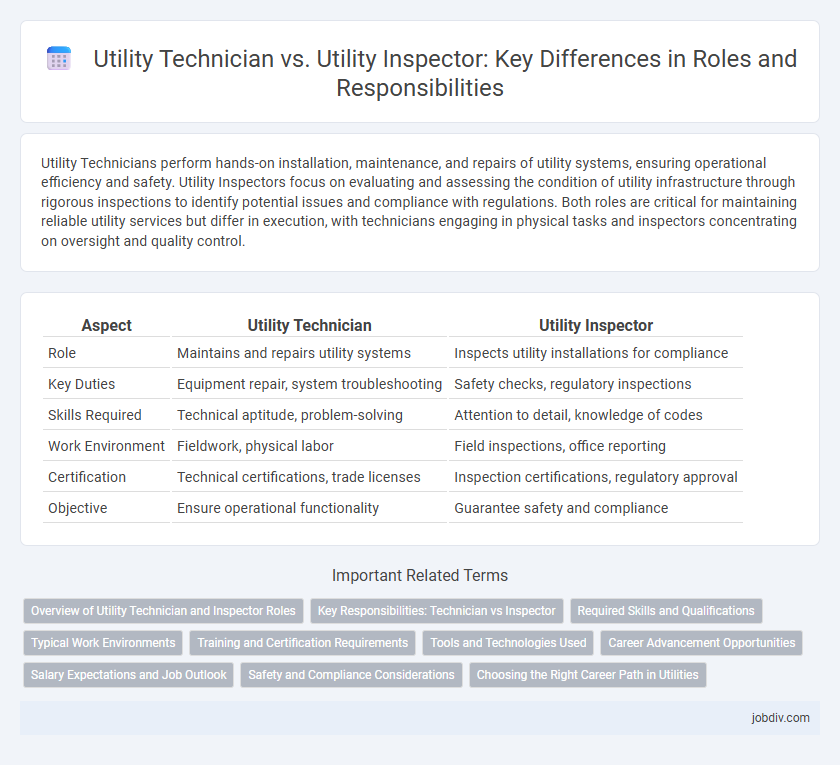Utility Technicians perform hands-on installation, maintenance, and repairs of utility systems, ensuring operational efficiency and safety. Utility Inspectors focus on evaluating and assessing the condition of utility infrastructure through rigorous inspections to identify potential issues and compliance with regulations. Both roles are critical for maintaining reliable utility services but differ in execution, with technicians engaging in physical tasks and inspectors concentrating on oversight and quality control.
Table of Comparison
| Aspect | Utility Technician | Utility Inspector |
|---|---|---|
| Role | Maintains and repairs utility systems | Inspects utility installations for compliance |
| Key Duties | Equipment repair, system troubleshooting | Safety checks, regulatory inspections |
| Skills Required | Technical aptitude, problem-solving | Attention to detail, knowledge of codes |
| Work Environment | Fieldwork, physical labor | Field inspections, office reporting |
| Certification | Technical certifications, trade licenses | Inspection certifications, regulatory approval |
| Objective | Ensure operational functionality | Guarantee safety and compliance |
Overview of Utility Technician and Inspector Roles
Utility Technicians are responsible for installing, maintaining, and repairing utility systems such as water, gas, and electrical lines, ensuring operational efficiency and safety. Utility Inspectors focus on examining and evaluating infrastructure compliance with regulatory standards, identifying potential hazards or faults to prevent service disruptions. Both roles are critical for maintaining the integrity and reliability of public utility services.
Key Responsibilities: Technician vs Inspector
Utility Technicians are responsible for the installation, maintenance, and repair of utility systems such as water, gas, and electrical lines, ensuring operational efficiency and safety. Utility Inspectors focus on monitoring and evaluating these systems through regular inspections, identifying regulatory compliance issues, and recommending corrective actions to prevent failures. Both roles prioritize system integrity, but Technicians perform hands-on technical work while Inspectors emphasize regulatory adherence and quality assurance.
Required Skills and Qualifications
Utility Technicians require hands-on skills in electrical systems, plumbing, and equipment maintenance, often needing certifications like OSHA safety training and technical diplomas. Utility Inspectors demand strong analytical abilities, knowledge of regulatory compliance, and expertise in conducting detailed inspections to ensure safety and standards adherence, usually requiring certifications in inspection methods and regulatory codes. Both roles benefit from problem-solving skills, attention to detail, and familiarity with industry-specific technology and standards.
Typical Work Environments
Utility Technicians typically work in outdoor environments such as power plants, substations, and construction sites where they install, maintain, and repair utility systems. Utility Inspectors usually operate in office settings or on-site locations, conducting inspections and compliance checks to ensure safety standards and regulatory requirements for utilities. Both roles may require exposure to various weather conditions and adherence to safety protocols in utility infrastructure environments.
Training and Certification Requirements
Utility Technicians typically require vocational training, hands-on apprenticeships, and certifications such as OSHA safety training or specialized equipment operation licenses. Utility Inspectors often need advanced qualifications, including certification from organizations like the National Association of Sewer Service Companies (NASSCO) or state-specific inspector credentials, along with comprehensive knowledge of regulatory standards. The distinction in training emphasizes practical skills for Technicians and regulatory compliance and inspection protocols for Inspectors.
Tools and Technologies Used
Utility Technicians primarily use diagnostic tools such as multimeters, pipe locators, and thermal imaging cameras to install, maintain, and repair utility systems. Utility Inspectors employ advanced inspection technologies including drones, ultrasonic testing devices, and GIS mapping software to assess infrastructure integrity and compliance. Both roles rely on specialized software for data analysis and reporting, but inspectors focus more on assessment tools while technicians emphasize hands-on repair equipment.
Career Advancement Opportunities
Utility Technicians gain hands-on experience with equipment maintenance and system operations, establishing a strong technical foundation critical for career growth within utility companies. Utility Inspectors leverage their expertise in regulatory compliance and safety standards to transition into supervisory or regulatory roles, often advancing into management or specialized inspection careers. Both career paths offer distinct advancement opportunities, with technicians progressing through technical certifications and inspectors expanding their qualifications through regulatory training and leadership development.
Salary Expectations and Job Outlook
Utility Technicians typically earn an average salary ranging from $40,000 to $60,000 annually, reflecting their hands-on roles in maintaining and repairing utility systems. Utility Inspectors command higher salaries, often between $55,000 and $75,000, due to their responsibility for regulatory compliance and system evaluations. Job outlook for both positions is positive, with increasing infrastructure investments driving demand, but Utility Inspectors may experience more stability and advancement opportunities because of their specialized expertise in safety and standards enforcement.
Safety and Compliance Considerations
Utility Technicians ensure the operational safety of electrical and water systems through routine maintenance and prompt hazard identification, directly reducing workplace accidents. Utility Inspectors focus on compliance by rigorously evaluating infrastructure against regulatory standards to prevent violations and potential legal liabilities. Both roles are critical for maintaining system integrity and protecting public safety in utility services.
Choosing the Right Career Path in Utilities
Utility Technicians handle field operations such as equipment installation, maintenance, and troubleshooting, requiring strong technical skills and hands-on experience. Utility Inspectors focus on compliance, safety audits, and regulatory inspections, demanding keen attention to detail and knowledge of industry standards. Choosing between these careers depends on your preference for fieldwork and technical problem-solving or analytical evaluation and regulatory enforcement.
Utility Technician vs Utility Inspector Infographic

 jobdiv.com
jobdiv.com